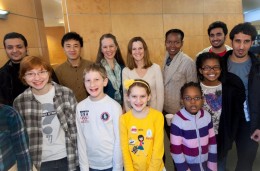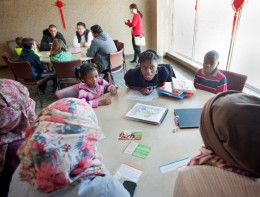Maps, flags, books and family photos decorated the room. A diverse group chatted about careers, marriage and food. But the focus was primarily on home schooling.
Thirty local parents and children involved in home schooling met with 45 international Wright State students Feb. 6 to discuss alternative education and cultural differences.
The students are part of Wright State’s LEAP Intensive English Program, which provides full-time English instruction and helps non-native speakers develop the linguistic, academic and social skills they need to be successful at a university in the United States. There are currently about 170 students in the program, up from roughly 25 in 2002.
Organizer Trisha Pomerville, adjunct instructor in the LEAP program, said the students are currently reading about the American educational system.
“We wanted to actually show our students an example of alternative education,” said Pomerville. “This gives them a great opportunity to practice their speaking skills, practice their listening skills and also learn more about American culture. They probably never get the opportunity to interact with families outside of the university.”
It was the sixth time in the past three years that local home-school families came to Wright State to meet with the international students. Home schooling is gaining popularity in the United States, but is often rare in the students’ native countries of Saudi Arabia, Kuwait, Iran, China, Honduras and Brazil.

Local parents and children involved in home schooling met with Wright State students in the LEAP Intensive English Program.
The students and home-school families—with children ranging in age from 4 to 17—broke down into small discussion groups during the two-hour session in the Millett Hall atrium.
Heidi Landes of Beavercreek brought her four home-schooled children to the event.
She met with two students from Saudi Arabia and two from Kuwait. The students wanted to know why Landes chose to home school, how many hours a day her children study, whether they take tests and whether she wants them to go to college.
“It’s a great experience for us,” she said of the event. “It is so neat for our kids to talk to people from other countries.”


 Wright State alum Lindsay Aitchison fulfills childhood space-agency dream
Wright State alum Lindsay Aitchison fulfills childhood space-agency dream  Wright State business professor, alumnus honored by regional technology organizations
Wright State business professor, alumnus honored by regional technology organizations  Wright State University Foundation awards 11 Students First Fund projects
Wright State University Foundation awards 11 Students First Fund projects  Gov. DeWine reappoints Board Treasurer Beth Ferris and names student Ella Vaught to Wright State Board of Trustees
Gov. DeWine reappoints Board Treasurer Beth Ferris and names student Ella Vaught to Wright State Board of Trustees  Joe Gruenberg’s 40-Year support for Wright State celebrated with Honorary Alumnus Award
Joe Gruenberg’s 40-Year support for Wright State celebrated with Honorary Alumnus Award 